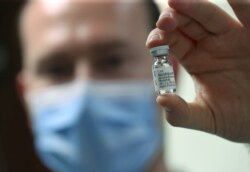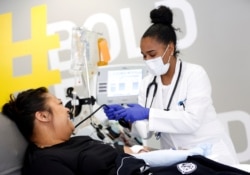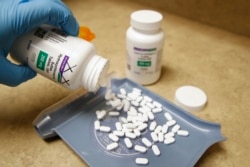One year into the COVID-19 pandemic, doctors are still searching for a breakthrough therapy.
They have figured out some things that help, such as anti-inflammatories and some antibody treatments.
They have learned what doesn't, including the politically charged antimalarial drug hydroxychloroquine.
But there is no easy-to-take pill to prevent or treat the disease.
"I think we have made a lot of progress, but none of them is a game-changer," said Adarsh Bhimraj, head of the neurologic infectious diseases section at the Cleveland Clinic. Bhimraj chaired a panel at the Infectious Diseases Society of America (IDSA) that wrote COVID-19 treatment guidelines.
When the panel issued its first recommendations last April, doctors were using "almost the kitchen sink approach," trying everything and hoping something works, said panel member Rajesh Gandhi, professor of medicine at Harvard Medical School.
The first guidelines were not much help, he added. "[For] every single therapy, we had insufficient data."
Nineteen revisions later, the latest ISDA guidelines were released this month. They include a handful of fairly effective treatments.
What works (sort of)
The best of the bunch is dexamethasone, a cheap, widely available steroid used to treat inflammation.
In many cases, the body's own overactive inflammatory response to infection is what kills COVID-19 patients. Dexamethasone helps tamp down that response.
Among hospitalized, critically ill patients, a third fewer died when given the drug, and more were released from the hospital within four weeks.
But dexamethasone helps only patients who are critically ill. It may do more harm than good for those who are not.
Another therapy that targets COVID-19 inflammation is the rheumatoid arthritis drug tocilizumab, from pharmaceutical company Genentech.
It lowered the odds that a patient would need a ventilator, intensive care or die, but only by less than 20%.
Drugmaker Gilead's antiviral drug remdesivir got a lot of attention last year as the first new drug against COVID-19 approved by the Food and Drug Administration. After a few studies, however, the results are underwhelming. It shortens recovery times in the most severe cases, but it does not reduce the risk of dying.
IDSA says it is better than nothing. But the World Health Organization does not recommend it.
Antibodies
One old remedy that came back in vogue with COVID-19 was convalescent plasma, a blood product from patients who have recovered from the disease. Red and white blood cells and platelets are removed from the blood, and the remaining yellow fluid contains the antibodies that the patient's immune system developed to fight off the infection.
Doctors used convalescent plasma to treat patients during the 1918 influenza pandemic and in a few earlier outbreaks of measles and mumps.
Convalescent plasma was widely used early in the COVID-19 pandemic. But few high-quality studies were done to test how well it works. So, neither IDSA nor the National Institutes of Health recommends it.
Monoclonal antibodies — lab-grown antibodies that target specific parts of the COVID-19 coronavirus — have shown some promise in keeping patients out of the hospital.
Two companies, Regeneron and Eli Lily, have two-antibody cocktails that seem to lower the risk of hospitalization, but IDSA's guidelines say the evidence for Lily's is stronger.
But these therapies need to be given soon after patients get sick and before they need to be hospitalized. They are delivered intravenously, and "there's not a good operational way to get them into people's veins," said Amesh Adalja, a senior scholar at the Johns Hopkins Center for Health Security and an emergency medicine physician.
As a result, "there's many monoclonal antibody vials sitting on shelves unused," Adalja said.
These drugs seem useful for patients only early in the course of the disease, Harvard's Gandhi said.
"By the time patients are sick enough to be in the hospital, it may be that the window of opportunity may have closed," he said.
New coronavirus variants threaten to undo the benefits of monoclonal antibodies.
In lab tests, the antibodies are still effective against the variant that first appeared in Britain. But they are less potent against variants identified in South Africa, California and New York.
Scientists do not yet know what the impact will be.
"We just need to see how that plays out," Gandhi said.
Hope, hype and hydroxychloroquine
In addition to a year's worth of data on what works, doctors now also know more about what does not.
Though it received a lot of attention from political conservatives, including former President Donald Trump, the antimalarial drug hydroxychloroquine did not live up to the hype in clinical trials, either with or without the antibiotic azithromycin.
More recently, a group of doctors calling themselves the Front Line COVID-19 Clinical Care Alliance has been promoting the use of ivermectin, a drug used against tropical parasites, as prevention and treatment for COVID-19.
The group points to several studies showing the drug can lower transmission and reduce the risk of death from COVID-19.
But the studies are small, biased or not of very good quality, the Cleveland Clinic's Bhimraj said.
"Like hydroxychloroquine, I think emotions have been running high," he said.
Bhimraj noted that ivermectin is attractive because it is a widely available, easily taken and fairly safe pill, but it needs more study.
"That's been the story of COVID-19 thus far," Gandhi added. "Things that we think and hope work don't sometimes turn out to work. And we don't know which way ivermectin is going to go unless it's really studied properly."







